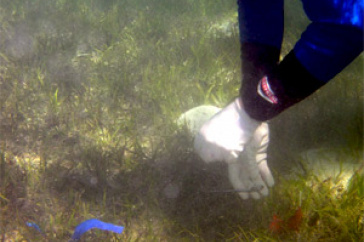UNH Folklorist Uncovers Complexities and Culture of Cape Breton Island in New Book

On the Great Barrier Reef in Australia, Fred Short, UNH research professor of natural resources and marine science, retrieves marked plants for an assessment of seagrass productivity.
DURHAM, N.H. - University of New Hampshire folklore professor Burt Feintuch was drawn to Canada's Cape Breton Island by the remarkably vibrant local traditional music culture. In 15 years of fieldwork, he came to understand the complexity of a place both achingly beautiful and deeply challenged by economics. With traditional mining, farming, and fishing industries depressed, tourism, though significant, is a less-than-adequate replacement as economic engine, and the island has faced an ongoing decline in population.
In his new book "In the Blood: Cape Breton Conversations on Culture," (Utah State University Press, 2010) Feintuch presents a set of interviews with 22 Cape Bretoners, representing a wide range of cultural engagement — a set of conversations about culture in a place where public discourse has focused on the idea of culture as an engine to pull the island out of its economic doldrums.
"What really inspired the book is that I fell in love with Cape Breton, and I wanted to do something to convey that, something that would be a gift to many of my Cape Breton friends, and something that might help others understand why the island is something we should care about," Feintuch says.
According to Feintuch, Cape Breton is striking in many ways.
"There's a very strong sense of shared identity, derived from histories that most people know. There's a deep affection for place -- everyone I talked to loves being home. There's a very high degree of what the writer Robert D. Kaplan calls 'community-mindedness.' There are deep economic challenges that have led to a need for a kind of creativity and flexibility. While I don't know that these things cause the cultural richness and artistic production, I think they're important factors, and I think that much of the art in Cape Breton, ranging from the traditional music to the remarkable literary creation, reflects those factors," Feintuch says.
In the book a cross-section of Cape Bretoners reflect on the sacrifices they make and joys they find living in such a culturally and scenically rich place.
The book includes interviews with master traditional musicians such as Buddy MacMaster and Mary Jane Lamond; the world-renowned writers Alistair MacLeod and Rita Joe; Gaelic and Francophone language activists such as Ginette Chiasson; well-known figures from politics and the local media, including Rodney MacDonald, Frank Macdonald, and Bob MacEachern; and cultural activists and economic planners such as Joella Foulds and Keith Brown, joined by representatives of heritage industries and others who are engaged with the island's thriving, and challenged, cultures.
New Hampshire Institute of Art photographer Gary Samson's portraits of each of the 22 interviewees, as well as of the island itself, add a rich dimension to these thoughtful and revealing conversations. "In the Blood" is a model for thinking about economic development, tourism, and traditional culture.
Feintuch is the author of "Eight Words for the Study of Expressive Culture" and coauthor of "The Encyclopedia of New England Culture." He has produced several recordings of Cape Breton music, including "The Heart of Cape Breton" from Smithsonian Folkways. He is director of the UNH Center for the Humanities and professor of folklore and English at the University of New Hampshire.
The University of New Hampshire, founded in 1866, is a world-class public research university with the feel of a New England liberal arts college. A land, sea, and space-grant university, UNH is the state's flagship public institution, enrolling more than 12,200 undergraduate and 2,200 graduate students.
-30-
Latest News
-
January 12, 2026
-
December 4, 2025
-
November 26, 2025
-
November 6, 2025
-
November 5, 2025













































